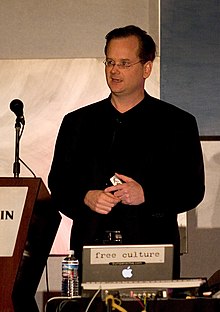
Back حركة الثقافة الحرة Arabic মুক্ত-সংস্কৃতি আন্দোলন Bengali/Bangla Freie-Kultur-Bewegung German Libera kultura movado Esperanto Movimiento por la cultura libre Spanish Vabakultuuri liikumine Estonian جنبش فرهنگ آزاد Persian Culture libre French Movemento pola cultura libre Galician मुक्त-संस्कृति आन्दोलन Hindi

The free-culture movement is a social movement that promotes the freedom to distribute and modify the creative works of others in the form of free content[1][2] or open content[3][4][5] without compensation to, or the consent of, the work's original creators, by using the Internet and other forms of media.
The movement objects to what it considers over-restrictive copyright laws. Many members of the movement argue that such laws hinder creativity.[6] They call this system "permission culture".[7]
The free-culture movement, with its ethos of free exchange of ideas, is aligned with the free and open-source-software movement, as well as other movements and philosophies such as open access (OA), the remix culture, the hacker culture, the access to knowledge movement, the copyleft movement and the public domain movement.
- ^ "What does a free culture look like?". Students of Free culture. Archived from the original on 2021-04-27. Retrieved 2009-10-24.
- ^ "What is free culture?". Students of Free culture. Archived from the original on 2021-04-27. Retrieved 2009-10-24.
- ^ The Alternative Media Handbook by Kate Coyer, Tony Dowmunt, Alan Fountain
- ^ Open Access: What You Need to Know Now by Walt Crawford
- ^ Open Content - A Practical Guide to Using Creative Commons Licences by Wikimedia Deutschland by Till Kreutzer (2014)
- ^ Larry Lessig (2007-03-01). "Larry Lessig says the law is strangling creativity". ted.com. Retrieved 2016-02-26.
- ^ Robert S. Boynton: The Tyranny of Copyright? Archived 2009-02-28 at the Wayback Machine The New York Times, January 25, 2004